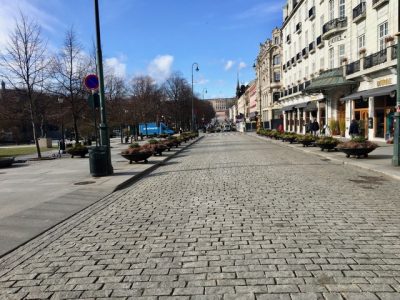NEWS ANALYSIS: There was no cause for celebration on Friday as Norwegians marked their first full year of battling the Corona virus. They’ll be able to head for their hytter during the Easter holidays, but restrictions otherwise are nearly as high as during the initial lockdown. The Corona crisis has also become much more politicized, as opposition parties in Parliament want attention in an election year.

It was on March 12, 2020 that Prime Minister Erna Solberg declared the Corona crisis had reached Norway. She famously stated how her government had to impose the “strongest and most invasive” measures since World War II, as she all but shut down the country.
She had, at the time, solid support within the Norwegian Parliament. There was a national feeling of common purpose and leaders of all opposition parties, not least Labour, declared how “the political Norway was standing together.” They firmly backed the Solberg government’s emergency efforts to stop the spread of the virus. National solidarity was paramount, not least after King Harald V called for it during a rare address to the nation.
The problem now is that few if anyone expected the Corona crisis to drag on so long. The virus threat continues to hover over the entire globe and in Norway, it’s interfering with the upcoming Parliamentary election in September. Opposition parties in particular now feel a need to promote themselves, and that comes at the expense of the government and national solidarity.
Critics position themselves
On Friday morning, for example, Labour Party leader Jonas Gahr Støre was on national radio complaining that Norway’s borders should have been “much better controlled” last summer and closed much earlier than they actually were. He acknowledged that Norway has fared much better than most countries during the Corona crisis, but he also criticized Solberg for not being consistent in following up on enforcement of her government’s own measures.
Støre is far from alone in trying to find fault with the Conservative government coalition’s strategy. The Progress Party claims it wanted to close Norway’s borders last summer, while the Center Party now opposes many of the restrictions in place and one of its leaders wants to buy vaccine from Israel. The Socialist Left and Reds parties have complained that compensation packages have been too generous with strong businesses and wealthy entrepreneurs, and not good enough for the rank and file.
‘Vaccine populism’
The rising political noise has prompted warnings. “A year ago, we were all in the same boat,” observed Helge Simonnes, former editor of the rural-oriented newspaper Vårt Land (Our Country). “The Corona pandemic mobilized the best in us, to take part in a huge national effort. 365 days later, it’s cracking up. Battling the pandemic and arguing over vaccination strategy have become political.”
Business newspaper Dagens Næringsliv (DN), meanwhile, editorialized against “vaccine populism.” It argued that Norway’s much-criticized vaccination program at home has actually been ranked among the best in the world. Vaccinations are moving slower than Norwegians expected, but around 10 percent of the population has at least had the first shots, and that ranks Norway behind only few other countries.
While opposition parties criticize how the government has tackled the Corona crisis, it can also be argued that it’s not a “crisis” at all. Norway’s Corona deaths (639 as of March 12) are arguably 639 too many, but a fraction of those in many other countries. The economy remains surprisingly strong and the housing market is booming. “Crisis? What crisis?,” queried one leading economist a few weeks ago. Most expect Norway’s economy to boom later this year, just as soon as most of the population is vaccinated and the country opens up again.
Easter holidays confined to Norway
On Friday, the government also confirmed that Norwegians will be able to travel to their hytter (holiday cabins) during the Easter holidays. Last year they were ordered not to leave their home communities during Easter, ruining traditional holidays and hurting the local economies of rural areas where Norwegians go skiing, hiking or even sailing during Easter. Solberg clearly didn’t dare order another “hytte ban” like last year, but instead issued certain demands: Norwegians can travel to their holiday homes within Norway, but they can’t invite any guests to join them. They must also continue to follow the rules that apply in their home communities.
Anyone venturing out of Norway on “unnecessary” holiday travel, meanwhile, will be punished upon arrival back home with mandatory testing on arrival and at least three days of quarantine at an airport hotel at their own expense. Justic Minister Monica Mæland made it clear that the government doesn’t want any Norwegians traveling abroad this spring, for fear they’ll bring more infection back home with them.
Health Minister Bent Høie conceded that Norwegians still face “different” Easter holidays, but he and state health director Dr Bjørn Guldvog tried to boost spirits by repeating that Norwegians “hopefully are in the last months of the pandemic.” Life in Norway may return to normal during summer, just in time for the campaign leading up to the election in mid-September.
NewsInEnglish.no/Nina Berglund

